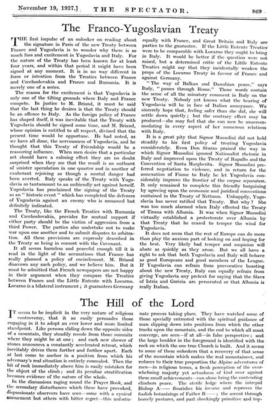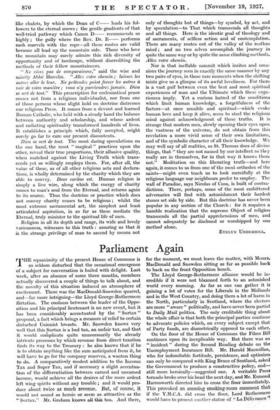The Hill of the Lord
T seems to be implicit in the very nature of religious controversy, that it so easily persuades those engaging in it to adopt an ever lower and more limited standpoint. Like persons sliding down the opposite sides of a mountain, they steadily recede from those summits where they might be at one ; and each new shower of stones announces a constantly accelerated retreat, which inevitably drives them further and further apart. Each at last come to anchor in a position from which his adversary's real situation is entirely concealed. Then the bit of rock immediately above him is easily mistaken for the object of the climb ; and its peculiar stratification becomes evidence of the nature of the whole.
In the discussions raging round the Prayer Book, and the secondary disturbances which these have provoked, dispassionate observers have seen—some with a cynical amusement but others with bitter regret—this unfortu- nate process taking place. They have watched some of those specially entrusted with the spiritual guidance of man slipping down into positions from which the other tracks upon the mountain, and the end to which all must converge, are seen—if at all—in false perspective ; and the large boulder in the foreground is identified with the rock on which the one true Church is built. And it seems to some of these onlookers that a recovery of that sense of the mountain which makes the real mountaineer, and reduces to their true proportion the Alpine adventures of men—in religious terms, a fresh perception of the over- whelming majesty yet actualness of God over against these small achievements—can alone bring the contending climbers peace. The sterile ledge where the intrepid Bishop A— flourishes his ice-axe and reproves the foolish botanizings of Father B—; the ascent through homely pastures, and past shockingly primitive and toy- like chalets, by which the Dean of C— leads his fol- lowers to the eternal snows ; the gentle gradients of that well-tried pathway which Canon D-- recommends so highly ; the gully where the Rev. Dr. E— performs such marvels with the rope—all these routes are valid because all lead up the mountain side. Those who love the mountain may surely admire this rich diversity of opportunity and of landscape, without discrediting the methods of their fellow mountaineers.
" Ne vivez pas de comparaisons," said the wise and saintly Abbe Huvelin. "Allez votre chemin ; laissez lee autres aller le leur. Ne pre,tendez point forcer les autres voir de votre maniere ; vous n'y parviendrez jamais. Dieu se serf de tout." This prescription for ecclesiastical peace comes not from a religious individualist, nor from one of those persons whose slight hold on doctrine distresses our religious Press. It comes from a devout and learned Roman Catholic, who held with a steady hand the balance between authority and scholarship, and whose ardent and radiating spirituality transformed hundreds of lives. It establishes a principle which, fully accepted, might surely go far to cure our present discontents.
Dieu se serf de tout. The most daring speculations on the one hand, the most " magical " practices upon the other, reveal their true proportions, their allusive quality, when matched against the Living Truth which trans- cends yet so willingly employs them. For, after all, the value of these, as of all other religious acts and declara- tions, is wholly determined by the charity which they are able to convey. Deus caritas est. Human religion is simply a live wire, along which the energy of charity conies to man's soul from the Eternal, and returns again to its source. Thus the doctrine or practice which does not convey charity ceases to be religious ; whilst the most extreme sacramental act, the simplest and least articulated aspiration, in so far as these mediate the Eternal, truly minister to the spiritual life of men.
Religion in all its depth and range, its wide and lovely cariousness, witnesses to this truth : assuring us that it is the strange privilege of man to ascend by means not only of thoughts but of things—by symbol, by act, and by speculation—to That which transcends all thoughts and all things. Here is the identic goal of theology and of sacraments, of selfless action and of contemplation. There are many routes out of the valley of the restless mind ; and no two selves accomplish the journey in quite the same way or by quite the same climbing methods. Allez votre chemin.
Nor is that ineffable summit which incites and occa- sions the journey seen in exactly the same manner by any two pairs of eyes, in those rare moments when the shifting mists give us a glimpse of its awful loveliness. For there is a vast gulf between even the best and most spiritual experiences of man and the Ultimate which these expe- riences imply. Yet a curious hatred of the conditions which limit human knowledge, a forgetfulness of the factors—at once sensible and spiritual—which evoke human love and keep it alive, seem to steel the religious mind against acknowledgment of these truths. It is strange that modern men, slowly opening their eyes upon the vastness of the universe, do not obtain from this revelation a more vivid sense of their own limitations, and of the symbolic character of all their knowledge. We may well say of all realities, as St. Thomas does of divine things, that " they are not named by our intellect as they really are in themselves, for in that way it knows them not." Meditation on this liberating truth—and here again, it comes to us from one of the most orthodox of the saints—might even teach us to look mercifully at the religious language our neighbours prefer to employ. The wall of Paradise, says Nicolas of Cusa, is built of contra- dictions. There, perhaps, some of the most embittered adversaries will find with astonishment their hardest stones set side by side. But this doctrine has never been popular in any section of the Church : for it requires a humble realization that the supreme Object of religion transcends all the partial apprehensions of men, and cannot adequately be disclosed or worshipped by one method alone.
EVELYN UNDERIIILL.















































 Previous page
Previous page